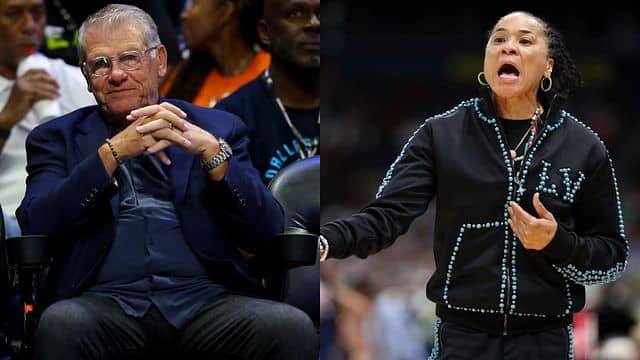“Someone’s Taking It Personally”: Analyst Suggests Behind-the-Scenes Tension Between Dawn Staley and Geno Auriemma Over Canceled NCAA Clash
In the world of college basketball, few rivalries have commanded as much respect, attention, and intensity as the one between two of the most iconic coaches in women’s hoops: Dawn Staley and Geno Auriemma. Both have built dynasties, reshaped the landscape of women’s basketball, and cultivated legacies that few can rival. So, when their highly anticipated NCAA matchup was abruptly canceled, fans and analysts alike were left scrambling for answers.
Recently, on The Hoops Cap Pod, analysts Mark Zanetto and Tee Baker dove into the cancellation, offering insights and speculation that hint at more than just logistical or scheduling conflicts. According to these insiders, tensions behind the scenes between Staley and Auriemma may have played a pivotal role, raising questions about what’s really going on between these coaching legends.
The NCAA women’s basketball calendar is always packed with marquee matchups, but few games generate the hype and excitement of a face-off between Dawn Staley’s South Carolina Gamecocks and Geno Auriemma’s UConn Huskies. The two programs have dominated the sport for over two decades, trading national titles and shaping the competitive landscape.
This season’s scheduled game was billed as a historic event—two powerhouse teams with championship pedigrees, top-tier talent, and coaching masterminds ready to go head-to-head. Fans, media, and players had been eagerly anticipating the battle, envisioning an epic showdown that would settle debates and elevate the women’s game even further.
Yet, out of nowhere, the game was canceled. Official statements from both programs cited “scheduling conflicts” and “unforeseen logistical issues,” but the lack of clarity left many wondering if there was more beneath the surface.
On a recent episode of The Hoops Cap Pod, veteran analysts Mark Zanetto and Tee Baker delved deep into the situation. Known for their candid and nuanced takes, Zanetto and Baker broke down the history between the two coaches, their coaching styles, and their publicly known interactions over the years.
Zanetto began, “On paper, this cancellation seems like just another bump in the road—a scheduling issue, a clash with conference commitments, maybe even a COVID-related precaution. But when you look at the timing and some of the whispers we’ve been hearing, it’s hard not to think that emotions ran higher than anyone’s willing to admit.”
Baker chimed in, “Exactly. Dawn and Geno have always had a competitive rivalry that’s respectful but fierce. But from what we’ve gathered, there’s been some friction behind the scenes—frustrations about scheduling, the timing of the game announcement, and possibly some personal disagreements. It’s rare for these two to let things get this public or impact the players, but this cancellation feels different.”
To understand why a canceled game might signal deeper tension, it’s essential to appreciate the history between Staley and Auriemma.
Geno Auriemma, the legendary UConn coach, has been synonymous with dominance in women’s college basketball since the mid-1990s. His 11 NCAA championships and multiple undefeated seasons have set a gold standard.
Dawn Staley, meanwhile, is a trailblazer in her own right—a Hall of Famer as a player and one of the most respected coaches of the modern era. Under her leadership, South Carolina has emerged as a national powerhouse, culminating in multiple Final Four appearances and a national title.
The rivalry between these two coaches has always been about respect and high stakes. Both value excellence, discipline, and the growth of women’s basketball, but both are also fiercely protective of their programs and legacies.
According to Zanetto and Baker, one key source of the tension lies in the timing and communication around the game’s scheduling.
“The initial announcement came somewhat abruptly,” said Zanetto. “South Carolina was reportedly told about the game later than UConn, which some insiders interpret as a slight. Given the stature of both programs, you’d expect more mutual respect in the planning process.”
Baker added, “There’s also talk that Dawn felt the scheduling didn’t consider South Carolina’s player welfare and academic commitments, while Geno and his staff were more focused on maximizing exposure and TV ratings. That created some friction.”
Additionally, rumors have circulated about a disagreement over media narratives and postgame interviews. “Both coaches are media savvy, and both want to control their team’s narrative,” Zanetto explained. “There’s been some back-and-forth over how the game would be presented and who gets the spotlight.”
Neither Dawn Staley nor Geno Auriemma have publicly aired grievances regarding the cancellation, but subtle signals have not gone unnoticed.
Staley’s recent press conferences have been more guarded than usual, with pointed emphasis on player well-being and team focus rather than marquee matchups. Auriemma, meanwhile, has reiterated the importance of adaptability and long-term vision, though his tone has occasionally suggested frustration with outside distractions.
One former player close to the South Carolina program revealed, “Coach Staley was definitely disappointed by the cancellation. She’s competitive and wanted to face UConn head-on. But more than that, she values clear communication and felt that wasn’t happening behind the scenes.”
Beyond the coaching rivalry, the cancellation has had ripple effects on the players and the broader women’s basketball community.
Both teams have standout athletes who were eager to measure themselves against elite competition. Missing this opportunity means a lost chance for growth, exposure, and experience in high-pressure situations.
Former WNBA star and college analyst Lisa Leslie weighed in, “Games like this are crucial for the sport. They elevate visibility, push players to new heights, and inspire young girls watching. When they get canceled, it’s a setback—not just for the teams but for women’s basketball as a whole.”
The canceled game is more than just a scheduling hiccup—it signals potential strains in one of college basketball’s most revered rivalries.
For Staley and Auriemma, maintaining a professional relationship is key—not just for their programs but for the growth and integrity of the sport they love. However, if personal tensions and behind-the-scenes frustrations aren’t addressed, it could impact future scheduling, media relations, and ultimately the players.
Zanetto concluded on The Hoops Cap Pod, “We’re hopeful this is just a momentary setback. Both coaches are professionals and champions of the game. But sometimes, even the greatest partnerships need honest conversations behind closed doors.”
Baker agreed, “At the end of the day, the fans want to see these two teams compete. The players deserve that chance. So here’s hoping Dawn and Geno can put whatever personal feelings aside and deliver what the sport, and its supporters, crave.”
This incident also shines a light on a broader need within college sports for more transparent communication and collaboration—especially between powerhouse programs whose rivalries are central to the sport’s popularity.
By fostering openness and mutual respect in scheduling and media dealings, coaches can not only preserve competitive rivalries but also build partnerships that uplift women’s basketball at every level.
The cancellation of the Dawn Staley vs. Geno Auriemma NCAA clash is more than a missed game—it’s a signal that even the most revered figures in sports are not immune to personal tensions and communication breakdowns. While official explanations remain vague, analysts Mark Zanetto and Tee Baker’s discussion on The Hoops Cap Pod suggests that behind-the-scenes emotions may be influencing decisions that impact the players and the sport’s trajectory.
As fans, players, and stakeholders await the next chapter in this storied rivalry, one thing remains clear: the legacy of these two coaches—and their commitment to women’s basketball—will continue to shape the game for years to come. Whether that legacy includes cooperation or conflict may depend on the conversations that happen now, away from the spotlight.



